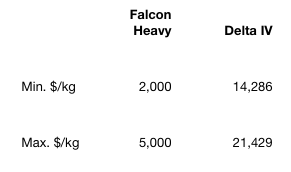US Monopoly on Space Transport

All Global Research articles can be read in 51 languages by activating the Translate Website button below the author’s name.
To receive Global Research’s Daily Newsletter (selected articles), click here.
Click the share button above to email/forward this article to your friends and colleagues. Follow us on Instagram and Twitter and subscribe to our Telegram Channel. Feel free to repost and share widely Global Research articles.
***
The Wall Street Journal confirms my previous analysis from 15 April 2023 (see below):
SpaceX has created a US monopoly on transport to Space. See this.
Nobody in the World can match the American SpaceX.
Neither in the US, the EU, Russia, China, or India.
- SpaceX’ costs to Space are so low that nobody can compete
- SpaceX’ flexibility, regularity, and safety are unprecedented.
Jeff Bezos’s Blue Origin, Lockheed Martin, Boeing, United Launch Alliance, and NASA’s SLS rocket are made ridiculous by SpaceX.
The Falcon Heavy rocket costs $ 100 million to launch – and can bring 20-50 tons to low-earth-orbit.
Falcon Heavy’s closest competitor is the Delta IV Heavy from United Launch Alliance (ULA – Lockheed Martin and Boeing).
The Delta IV rocket costs $400-600 million to launch – and can bring 28 tons to low-earth-orbit.
Falcon Heavy saves $300-500 million per launch.
The key is to minimize the price in dollars per kg to orbit.
The comparison gives this:
A 10 kg satellite can get into orbit for $10,000 – 50,000 dollars!
We see that the Falcon Heavy gives a cost-reduction of between 60 % and 90%.
SpaceX will reduce launch costs far more from 2024 onwards with its fully reusable Starship, which aims to send 100 tons to orbit for as little as $1 million per launch. That is only $10 per kg.
China will mimic the Falcon Heavy within probably 5 years – that’s a lot of time. But China has no serious program even within 15 years for anything similar to SpaceX’ next vehicle, the Starship which will go commercial in 2024.
Russia has neither.
The US is has already created Space Dominance with SpaceX.
Technically, Russia, China, India, and the EU they can still send stuff to Space – but only at slow pace – and they spend far more money getting it up than building it.
*
Note to readers: Please click the share button above. Follow us on Instagram and Twitter and subscribe to our Telegram Channel. Feel free to repost and share widely Global Research articles.
Karsten Riise is a Master of Science (Econ) from Copenhagen Business School and has a university degree in Spanish Culture and Languages from Copenhagen University. He is the former Senior Vice President Chief Financial Officer (CFO) of Mercedes-Benz in Denmark and Sweden.
He is a regular contributor to Global Research.
Featured image: US Space Domination – Karsten Riise and Brian Mcgowan, Unsplash CC0


